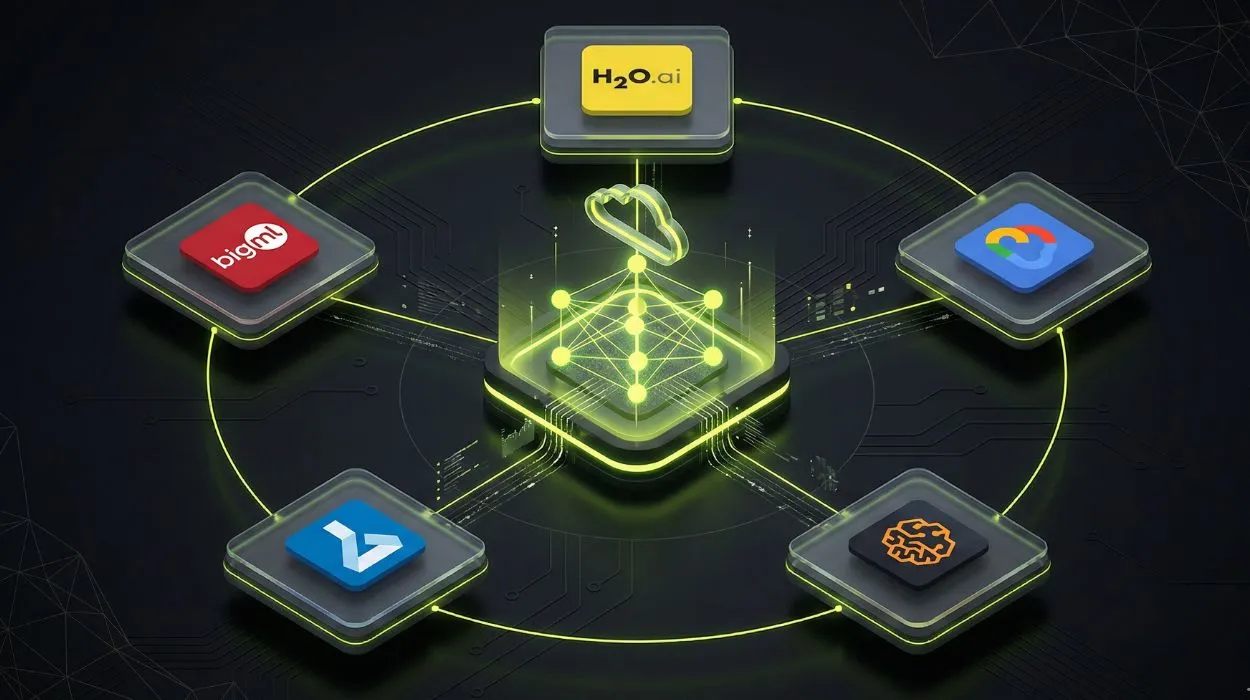The current rapidly evolving Artificial Intelligence world poses entrepreneurs with the need to seek good services that can convert their data into valuable insights. Abacus AI alternatives are a household name in artificial intelligence-driven analytics, and there are numerous other businesses seeking alternatives that meet their requirements, budget, or technical configuration.
You need a less expensive alternative, unique capabilities, or unique deployment options. Selecting the appropriate Abacus AI competitors will actually alter the way you examine information. This guide will examine the 10 best options, describe their features, prices, and the reasons why they are so special, so that you can make a wise choice.
What is Abacus AI?
Abacus AI alternatives is a professional AI platform that critically seeks to simplify AI and machine learning for companies of any size. It was designed in such a way that advanced AI could be used by businesses without having significant data science expertise. It enables your use of deep learning and automatically creates AI models (AutoML), as well as running AI in real time.
It assists in outcome prediction, forecasting, experience customization, as well as identification of unusual data. Flexible automation and easy user interface allow businesses to implement AI more quickly with Abacus AI, reducing the complexity that typically surrounds the development of machine learning.
Also Read: Janitor alternatives
Key Features and Capabilities
- AutoML: Rushes, trains, and optimises models by auto-ML without speeding up the initial starting time.
- Real-time AI Into Action: Allows you to test AI models that provide a real-time prediction.
- Pre-defined Use Cases: includes template forecast, personalization, machine learning fraud, and machine learning maintenance.
- Model Monitoring & Explainability: follows through on model performance, provides viewable explanations, and identifies changes in data.
- Multi-Cloud Deployment: May be deployed on AWS, Azure Cloud,d or your chosen servers.
- API integration: USES with workflows that are already in place in RESTful interfaces and numerous types of data.
- Many modern platforms also integrate AI video generator capabilities, enabling businesses to automate campaign creation and optimize ad performance using real-time data insights.
Why Are People Looking for Abacus AI Alternatives
- Price: Enterprise fees can be prohibitively expensive to small companies or start-ups.
- Specific Functionality: There are also companies that require industry-specific technology, which is not part of the target of Abacus AI.
- Learning Curve: Although automation ultimately becomes automated, the process is overly technical in some teams.
- Customization: Sometimes model flexibility may be required as a result of unique workflows.
- Integration: Spatially, Abacus AI may not be a good match with the technology at hand.
- Vendor Diversity: Organizations do not want to be confined to a single vendor.
Key Metrics to Compare (When Choosing Alternatives)
- See Usability: Check the UI itself, start and glance at initiation and non-technical usability.
- Speed and Accuracy of the model: Compare the quality of the prediction, speed of processing, and capability of data volume.
- Pricing Transparency: Take into account all the costs, such as licenses, computing, support, and the unnoticeable costs.
- Deployment Checks: Cloud, on-premise, hybrid, and mixed support cloud vendors.
- Integration: Test whether or not it supports your business tools and data.
- Support and Docs: Watch videos and read customer support, community support, tutorials, and manuals.
Comparison Table: Top Abacus AI Alternatives
| Name | Best For | Pricing |
| DataRobot | Enterprise-scale automated ML | Custom pricing (starts ~$50K/year) |
| H2O.ai | Open-source ML and AutoML | Free (Driverless AI from $50K/year) |
| Google Cloud AutoML | Google Cloud ecosystem users | Pay-per-use (from $3.15/hour) |
| Amazon SageMaker | AWS infrastructure users | Pay-as-you-go (from $0.05/hour) |
| Azure Machine Learning | Microsoft ecosystem integration | Pay-per-compute (from $0.15/hour) |
| Dataiku | Collaborative data science teams | Custom pricing (starts ~$40K/year) |
| RapidMiner | Business analytics professionals | Free tier, Pro from $2,500/year |
| Alteryx | Data preparation and analytics | From $5,195/user/year |
| BigML | Developers and small businesses | Free tier, from $30/month |
| Vertex AI | Unified ML platform on GCP | Pay-as-you-go (varies by service) |
Top 10 Abacus AI alternatives
1. DataRobot
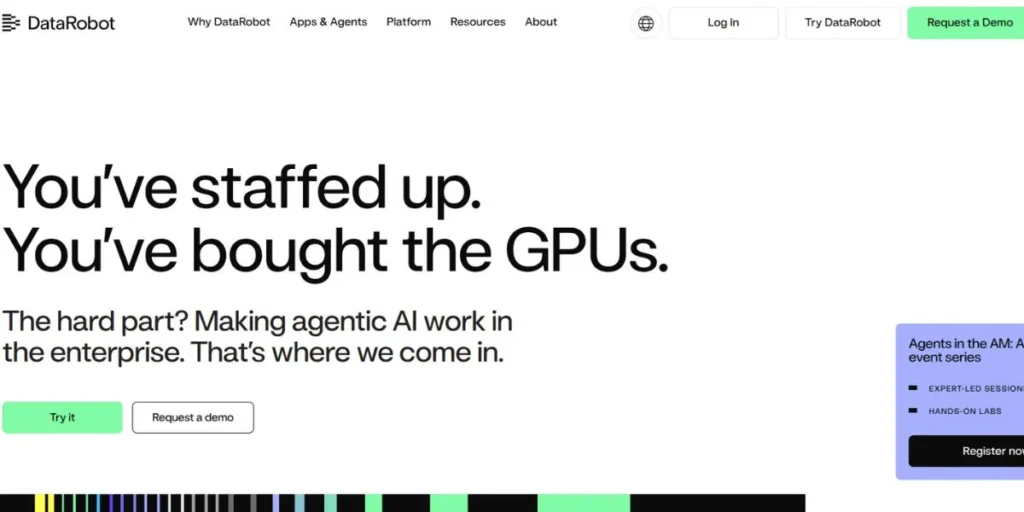
DataRobot is a large and holistic, non-stereotypical Abacus AI alternatives platform, which has automated machine learning that is valid and can process a significant amount of information. It not only cleans data but also puts models into production and monitors them. Built-in tools can automatically test hundreds of different models to select the most suitable for what you need, and companies that are eager to have an AI ready-to-use will appreciate it. It also possesses excellent model control rules, numerous methods of launching models, and full support of machine learning operations. Major enterprises in healthcare, financial, retail, and manufacturing use it.
Key Features
- Powerful AutoML builds lots of models and settings.
- Automatic feature creation, Time-series forecasting.
- Explain the models with SHAP values to you to understand why they are made.
- Complete MLOps with model monitoring, model governance, and automated retraining.
Pros
- Quite precise models of a variety of activities.
- Business frequent compliance and hrequire igh-level security.
- Scales very well with big clouds.
Cons
- Small businesses may not be able to pay the price.
- Sophisticated functions are difficult to master.
- Is very power hungry.
Pricing
The enterprise pricing is beginning to come in at approximately 50000 / year, depending on features and size.
Website Link: https://www.datarobot.com
2. H2O.ai

H2O.ai is another powerful competitor that is more of a free and open-source tool mixed with more professional features. It provides you with free H2O-3, a machine-learning framework, and even with Driverless AI, which is a paid product with automated machine learning. It is fast in deep learning, as well as distributed computing with big data. Python, R, Java, or Scala. It is developer-friendly. This is the best Abacus AI alternative.
The community is dynamic, and it includes professional capabilities such as auto-documentation and simple modes of comprehending models, therefore, matches both startups going through AI trials and companies initiating production endeavors.
Key Features
- Free Open H2O framework and a commercial Driverless AI optic.
- Huge amounts of data are processed by distributed computing.
- Proprietary automatic feature engineering.
- Overall demonstration of some methods of explanation of the models clearly.
Pros
- Open source edition, which does not require a fee or restriction to use.
- Good community and plenty of documentation.
- Runs well on large data sets
Cons
- Technological expertise is required to install the open source version.
- Enterprise functions are additional.
- Less popularity of template industry designs compared to competitors.
Pricing
The H2O -3 is free; Driverless AI begins at approximately 50000 dollars annually.
Website Link: https://www.h2o.ai
3. Google Cloud AutoML
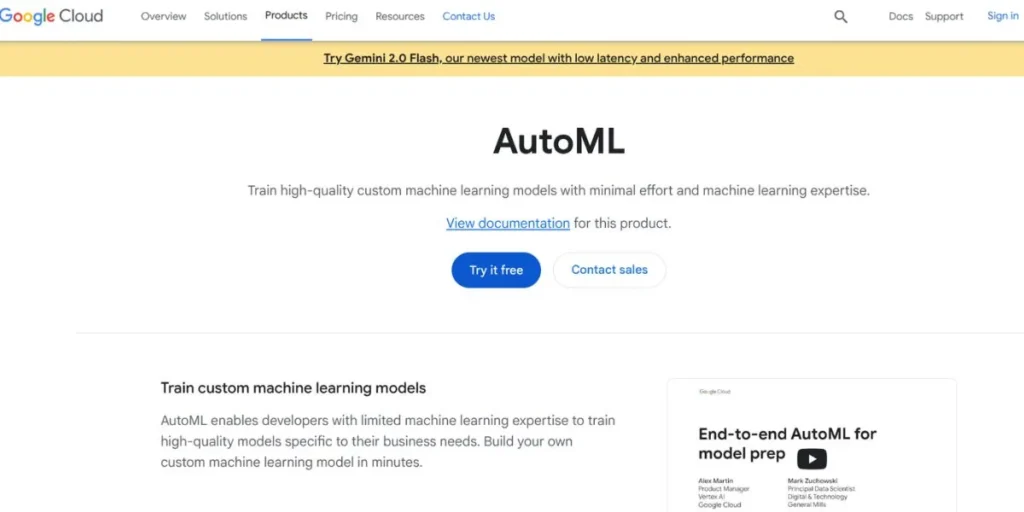
Google Cloud AutoML is suitable for organizations that already utilize the Google Cloud or any company desiring the best machine learning solutions. It is implemented based on the advances in AI research and search for neural architectures, such that you can easily train some custom models with little expertise in machine-learning.
It possesses image, language, translation, tables, and video special tools. AutoML also uses the already trained models at Google, thus training is less time-consuming and requires less data. It does not have any issues with working with BigQuery, Cloud storage, and other services of Google Cloud, and thus it is most attractive to businesses that depend on the Google Cloud.
Key Features
- Search to discover the optimum model design by searching the architectural space.
- Image, text, and structured data for special AutoML.
- Graphing based on Google Cloud and BigQuery.
- Makes use of pre-trained models at Google through their transfer learning.
Pros
- Supported by the best AI research by Google.
- Superb in pictures and language work.
- Pay-per-use prices allow you to simply pay per usage.
Cons
- Better when you have been a user of Google Cloud.
- Not as flexible as hand-coded methods.
- Can become expensive at scale
Pricing
The initial cost of pay-per-use is training: 3.15 USD/ane /hour and predictions: 1.25 USD/ane/hour.
Website Link: https://cloud.google.com/automl
4. Amazon SageMaker
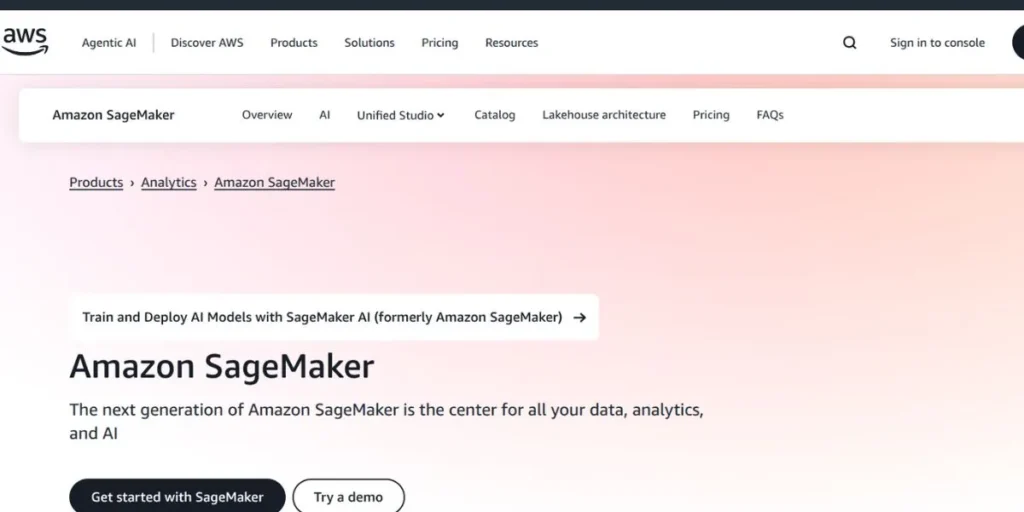
Amazon SageMaker is the full-scale AI acquired by AWS that regulates the process of labeling information for the implementation of models. It deals with the end-to-end machine-learning process of labeling, cleaning, building, training, tuning, launching, and monitoring models. It provides SageMaker Autopilot to assin ist the creation of models automatically, SageMaker Studio as an IDE with built-in algorithms for distributed training, and one-click launch. Since it is already deeply connected to AWS services such as S3, Lambda, and EC2, businesses are able to use their existing AWS infrastructure to create new, more complex AI applications.
Key Features
- SageMaker Autopilot is an automated model-building system.
- Algorithms can be distributed and trained.
- SageMaker Studio IDE assists the collaborating teams with each other.
- Drift and retrain drift monitors.
Pros
- Works seamlessly inside AWS
- Prices and rates may be adjusted as time goes on.
- So much educational material and records.
Cons
- Ability may seem complicated to novices.
- AWS skills are required to achieve the best results.
- Costs grow with heavy use.
Pricing
Pay as you go was introduced in 2010. Pay as you go ofortraining costs 0.05/hour, depending on the type of instances.
Website Link: https://aws.amazon.com/sagemaker
5. Azure Machine Learning

MicrosoftAzure machine learning is a sound AI platform in companies, using Microsoft products or companies adjusted to demanding security and compliance. It provides automated machine learning, a drag-and-drop designer, and offers both coding and no-coding for working with it. Azure ML also supports hybrid and multi-cloud environments, to the extent that you can train in your on-premises environment and deploy anywhere.
Its high level of integration with Power BI and Office applications makes it highly appealing to companies using Microsoft apps. It further has the features of responsibleAI, including fairness checks and simpler model understanding to address the demands on governance.
Key Features
- ML automation and responsible AI + fairness.
- Drag-and-drop model-building designer, no code.
- MLOps, which works with Azure DevOps.
- And supports edge deployments and cloud deployments.
Pros
- Very nice with the Microsoft users.
- powerful compliance characteristics and security.
- Permits code-first as well as no-code.
Cons
- Learning commitment when investing in Azure. You are new.
- Best value to the current Microsoft customers.
- There are several features that require two or more Azure services.
Pricing
The most affordable pay-per-compute is approximately 0.15 per hour and depends upon resources utilized.
Website Link: https://azure.microsoft.com/en-us/services/machine-learning
6. Dataiku
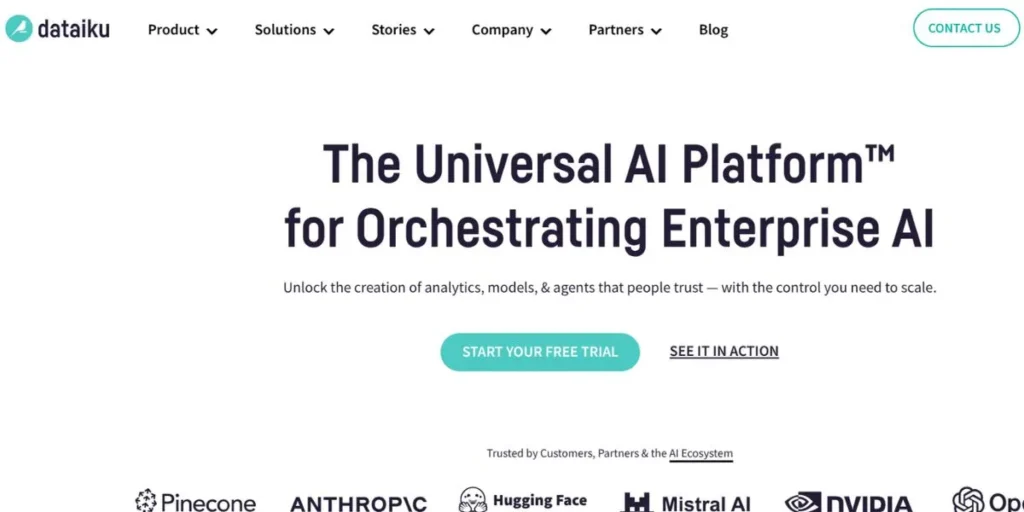
Dataiku is an open work Abacus AI alternatives platform, which supports duos of data scientists, analysts, and business individuals to settle down. It has an interface with a positive graphical interface and allows individuals lacking coding expertise to draw up data, clean it, create models, and execute them. Dataiku is a complete workflow in a single place, and your data rules, project organization, and knowledge sharing are a bit perfect.
It has powerful automated model work and also full code options for both beginners and power users. It integrates with more than 90 data sources and has support with current tools such as Tableau, thus allowing companies to maintain their existing processes.
Key Features
- Multi-functional team work space.
- Both graphic and code development features.
- In-built project management and control systems.
- 90+ data connector library.
Pros
- Team data science projects
- Easy on non-programmers.
- Powerful data preparation and data visualization.
Cons
- Enterprise version with premium pricing.
- It is overwhelming with numerous features.
- Coding requires some state-of-the-art ML functionality.
Pricing
Enterprise pricing begins as users and deployment price at a point of approximately 40,000 or higher per year.
Website Link: https://www.dataiku.com
7. RapidMiner
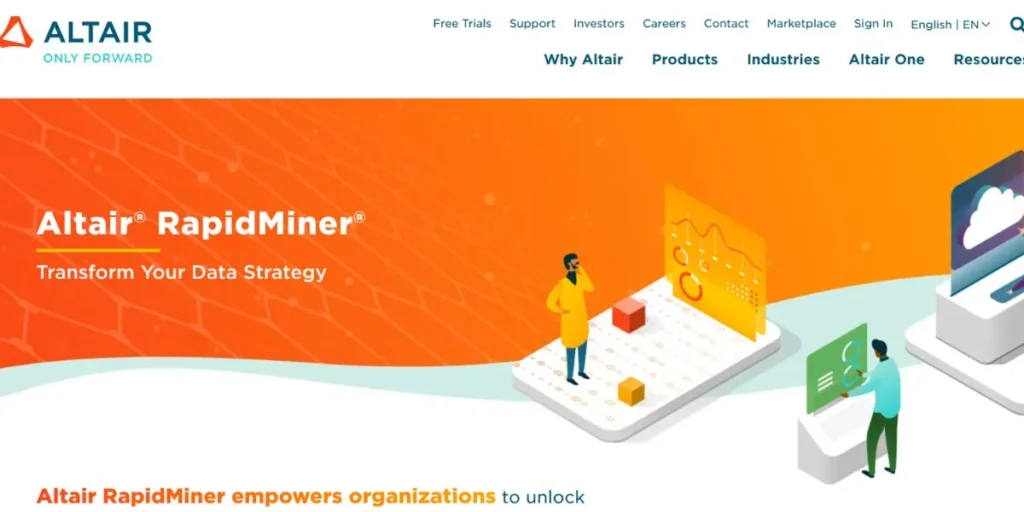
RapidMiner is an easy-to-use Abacus AI alternative tool that permits anyone to build predictive models with no heavy programming. Business analysts and those interested in entering the field of data science like it. Learning is easy because the drag-and-drop model allows one to easily make steps to clean data, model, and publish models.
It also automatically optimizes models, maintains a large library of algorithms, and allows you to deploy models either as batch jobs or as live APIs. RapidMiner also provides training, such as the RapidMiner Academy, that enables enthusiasts on novel teams to gain knowledge of AI, as well as transition out of habitual reporting to machine-learning initiatives.
Key Features
- Drag-and-drop artist visual workflow designer.
- Tuned and optimized with automation.
- Library of 1,500+ algorithms
- Instructional material and training course offerings.
Pros
- Simple interface to support business analysts.
- Learning and small project versions can be free.
- Strong community support and learning materials
Cons
- Graphical boundaries promoted personalization.
- Slow when working with very large data sets.
- A paid license is needed for enterprise features.
Pricing
Free version included; Professional version would begin at approximately 2,500 USD/user/annum.
Website Link: https://rapidminer.com
8. Alteryx
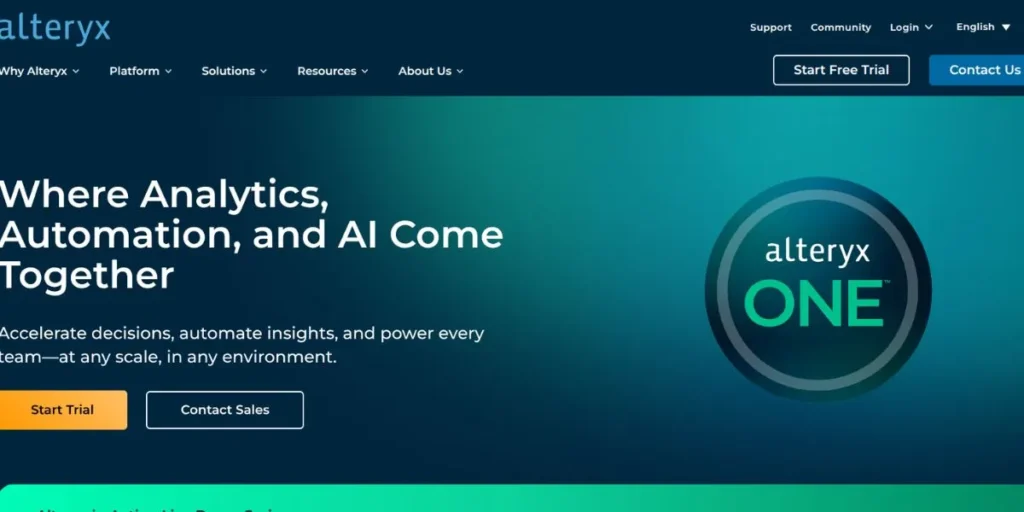
Alteryx has provided the end to end analytics platform, enabling the movement of data cleaning to the next level of analysis within the same platform. It began with some data preparation, but currently it is becoming a machine-learning platform as well as an Assisted Modeling and Intelligence Suite. It is particularly powerful in spatial information, handy with retail, real estate, and logistics. This comes in the best Abacus AI alternatives.
Its no-code interface allows analysts to create complex workflows, combining data in hundreds of sources, cleaning it, performing statistics, and creating predictions. The gallery feature gives users the opportunity to save and set up workflows with ease and promote analytics across a corporation.
Key Features
- Sophisticated data preparation and combination packages.
- Automatic machine learning assisted model.
- Spatial analytics/location intelligence tools.
- Idle Gallery Automated work scheduling and workflows.
Pros
- Very good data preparation feature.
- No‑code UI is user-friendly to businesses.
- Big with spatial and location information.
Cons
- Exorbitantly high price, compared to some of its competitors.
- Less focus on deep learning
- Require an annual license, thus a continuing expense.
Pricing
Begins with the Designer edition, which is priced at $5,195 per user per year.
Website Link: https://www.alteryx.com
9. BigML
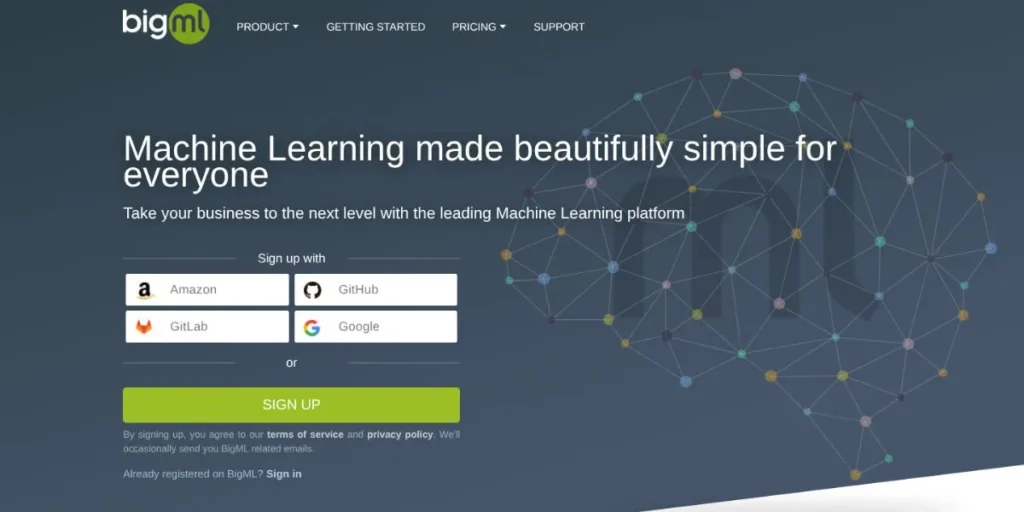
The simple and straightforward AI BigML is focused on developers, small businesses, and wants what is easily understandable by people in terms of machine learning. It emphasizes simplifying Abacus AI alternatives using a web interface, APIs, and no complicated pricing. It is home to supervised, unsupervised, forecasting, and anomaly detecting, and it prefers the clarity of models.
The WhizzML language allows users with advanced programming skills to program scripts, yet allows beginners to work with the visual interface. BigML also offers free classes and a high-end free tier, meaning that one can dig into AI without spending any money.
Key Features:
- coherent and explainable machine learning models.
- RESTful Services to make it easy in integrating.
- Web-based automation scripting language WhizzML.
- Has supervised, unsupervised, and time sequence supports.
Pros
- Free tier and cheap.
- Effective as a matter of learning and education.
- Pay attention to model impressibility.
Cons
- Limiting higher characteristics than business portals.
- Smaller community
- Not suitable for large deployments.
Pricing
Free version; the paid version begins at 30 dollars/month, with other options offered.
Website Link: https://bigml.com
10. Vertex AI
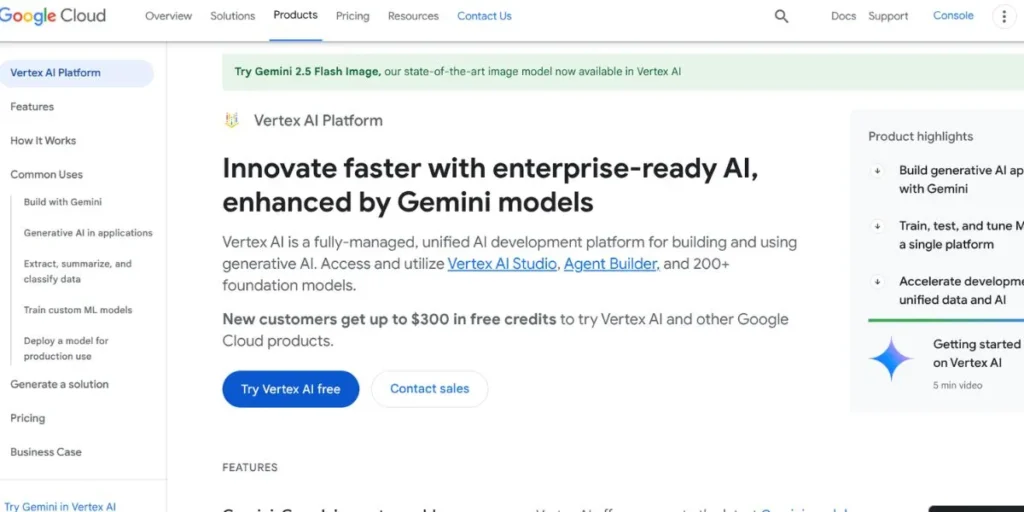
Vertex AI is an all-in-one service offered by Google Cloud, and it brings together numerous machine learning tools. It assists you with the creation, deployment, and scaling of AI models. The next phase of the Google ML platform is Vertex AI. It combines the experience of AutoML and Abacus AI alternatives Platform into one that allows you to build models either automatically or manually.
The platform will provide ready-to-use APIs of vision, language, and chat, among others, as well as software that assists you in managing every aspect of the ML process. The Future of MLOps as per Vertex AI includes the Feature Store, Model Monitoring, and Explainable AI, which provide businesses with insights.
Key Features
- Combined platform of AutoML and tailored training.
- Ready to use models and universal APIs.
- Attributes: Features are centrally-stored in the Feature Store.
- AI explainable and model surveillance software.
Pros
- Full-stack MLOps functionality.
- Takes advantage of the high stability of Google.
- Pricing according to the factual use of resources.
Cons
- I need expertise in Google Cloud.
- It can assume complicated forms in simple applications.
- Works well in a combination of multiple uses of Google Cloud.
Pricing
Training costs vary; however, it is pay-as-you-go, and costs vary depending on the resources one uses.
Website Link: https://cloud.google.com/vertex-ai
How to Choose the Right Alternative for You
- Determine Your Technical Skills: Understand what your team is aware of- no-code cloud systems, such as RapidMiner, are not used by data scientists but with analyzers.
- Create Your Budget Limits: Choose the pricing that best fits your needs- startups might need to opt for cheaper plans such as BigML, whereas bigger organizations can afford DataRobot.
- Take into account your current infrastructure: Take your existing one- Azure ML when you are Microsoft, SageMaker with Amazon, or an iteration concept of a neutral (H2O.ai).
- Determine Specified Use Case Requirements: Find the application that fits your tasks- Alteryx with spatial data, or Google Cloud AutoML with text.
- Evaluate Scalability Needs: Scale out and grow–select a platform that can scale with increased volume of data, users, and intricate models.
- Test Before Committing: Test available features- most sites will provide you with free trials so you can test their data using their information before purchase.
Conclusion
Selecting an appropriate Abacus AI alternative requires close attention to what your business requires, what your team can do, and what you wish to achieve. Abacus AI is a very strong force, and the alternatives included in this guide have their advantages. Datarobot and H2O.ai are very good on large automated-ML, cloud programs such as SageMaker, Azure ML, and Google Cloud AutoML are well integrated with other cloud services, and systems such as RapidMiner and big-ml are convenient to small teams.
The most optimal option comes out to be the one that weighs down between cost, level of skills, infrastructure, and the activities you are required to engage in. Comparing these options and outstanding arguments above, you can choose which platform will make your AI work faster and provide lasting value in the present day.
Also Read:
FAQs
In which case can Abacus AI be most cost-effective in a small business?
BigML is the cheapest. It offers a free tier and is priced at 30 a month, so it’s best suited to those interested in trying ML but have small businesses and startups capital and failing to meet the minimum budget.
What do organizations using the AWS infrastructure prefer as an alternative?
Amazon SageMaker is designed to band together perfectly since it links to the Amazon S3, Lambda, and more, such that you do not have to change.
Am I required to have knowledge of coding to apply these Abacus AI alternatives?
Zero-code systems such as RapidMiner, Alteryx, and Google Cloud AutoML enable business analysts to work in the system with H2O.ai, SageMaker, assisting those who have at least some experience in coding.
What platform has the most and best model explainability functionality?
InformationRobot and BigML provide powerful elucidation instruments such as SHAP values and feature prominence, and easy-to-understand decision trees, valuable for regulations.
Are these alternatives capable of real-time predictions and deployments?
Yes–the vast majority of them, including SageMaker, Azure ML, Vertex AI, and DataRobot, provide live inference via API endpoints, such that you can immediately get predictions in production.

